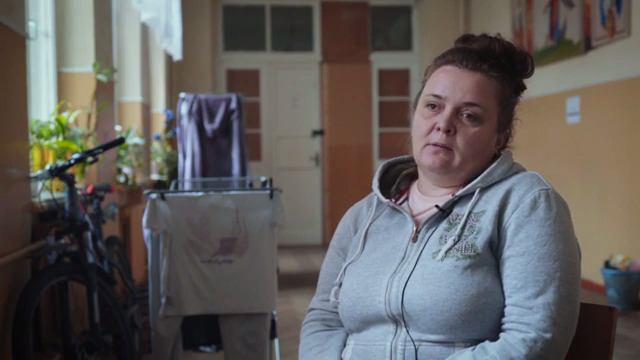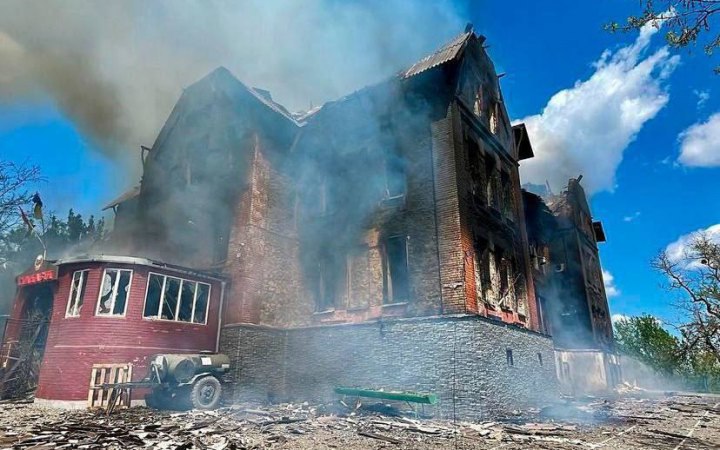‘Children from the intensive care unit still connected to machines were lowered into the basement’
My name is Yuliia Oleksandrivna Kuznetsova. I am from the city of Lysychansk. I came to the town of Drohobych after the occupation.
How did the events of 2014 develop in your region?
In 2014, when the shelling began, the Starobelsky district had not yet been occupied. Our aunts, grandfather, and grandmother lived there. My child and I went to my aunt, but my husband stayed here. He was then working at an oil refinery. The shelling started, and the tanks exploded during his shift. The shell hit the tank and destroyed the plant. It was terrible. We watched how the whole city was in black smoke. My child and I were frightened, and it was difficult to live through these events.
How unexpected were the events of 24 February for you?
There were rumors that there would be a war. Get ready, people. Stock up on money and food. Everyone! But no one believed. Until recently, no one believed. And I didn’t want to believe the war would happen. My husband and I divorced two years before the war. I was left alone with the child. When the bombing began, my mother called me. She lived in the private sector, and we were in an apartment. We went to her basement and were there for about a week.
Then terrible things began... The shells flew right over the house. Debris fell into our yard and blew away the corner of the house.
Then we went with the child and mother to the local children’s hospital where she worked. There was a large basement nearby where everyone gathered. We stayed there for a week or two.

How difficult was the humanitarian situation in the city?
As long as there was light, it was not so bad. And when it disappeared, how could we prepare the food? We had dry food only. And you can’t explain to a child why there is no hot food. Also, there was not enough of it. At first, they brought food to the hospital: there was bread and so on. However, later it got worse and worse. Finally, even the hospital got no supplies, so we could not cook anything.
Have you witnessed the destruction of civilian facilities?
The house’s roof was blown entirely off on my mother’s street. My apartment also was damaged, not at the beginning of the invasion, but later. The shell hit the window of a nine-story building and flew into the bedroom.
It penetrated the house, and the second entrance was damaged — burned to the ground.
I have nowhere to return with a child. When we were in the hospital, all the windows flew out. Everything was destroyed. We saw the doctor getting shrapnel in the ear. It was terrible. Children in intensive care were lowered into the basement, still connected to the machines.
Did you have problems with the lack of medicines?
When we were in the basement of the children’s hospital, people bought everything they could. Over time, there was nothing to buy. Thank God I’m a nurse. I worked in the infectious diseases unit for ten years. Mom worked in intensive care. I understand drugs and gathered medicines for flu, fever, and colds. That’s how we survived.
How did you evacuate from the city?
It was terrifying there. Shells were flying; the hospital was shelled, and there was no money. I didn’t think about going anywhere; I wanted to stay. But my husband’s uncle volunteered to find us a driver, who helped to get out of the city. We didn’t think we could leave because of the continuous explosions. The driver took us to the train, and we were on the train for 24 hours without light. I didn’t know where I was going. I didn’t know anything. They just gave us a place and said: “Go and don’t come back; the main thing is to stay alive!” And that’s it.

How did the war affect the emotional state of the child?
Now the child is 13. He was distraught and couldn’t understand what was happening. Why was everything happening so fast? Why should we leave our house, toys, and the city where he grew up? It was tough. The condition of the child is a complex topic. You see, it’s hard for us adults but a thousand times harder for children. They left everything they were used to. Thank God that there were children with whom he could connect. It united them and helped them to endure everything very courageously.
What do you know about civilian casualties?
I didn’t know people killed by “Grads”[rockets], but from heart attacks — yes. A woman died on our street. So many older people did not survive this war.
Do you plan to return to Lysychansk after the end of the war?
Firstly, we have nowhere to return with the child. We don’t have a home. There was another house that remained after the death of my father. The Russians opened it, put in generators, and later mined it. Neighbors said they lived there. So it’s also scary to go back there. In truth, there is nowhere to return. I wanted to plan something here, but my son dislikes the place. He doesn’t even go to school in Drohobych because he doesn’t want to.
I try not to injure the child’s psyche. He remained on distance learning in Lysychansk with his teacher and classmates. That’s how he studies. We need housing and financial help. He needs medical exams and treatment. A child needs a lot to learn, but we have nothing. When faced with distance learning, we did not have a phone, laptop, or computer. There was nothing. We bought it all using TDP (temporarily displaced person) assistance and some of our money. We economize and save.





